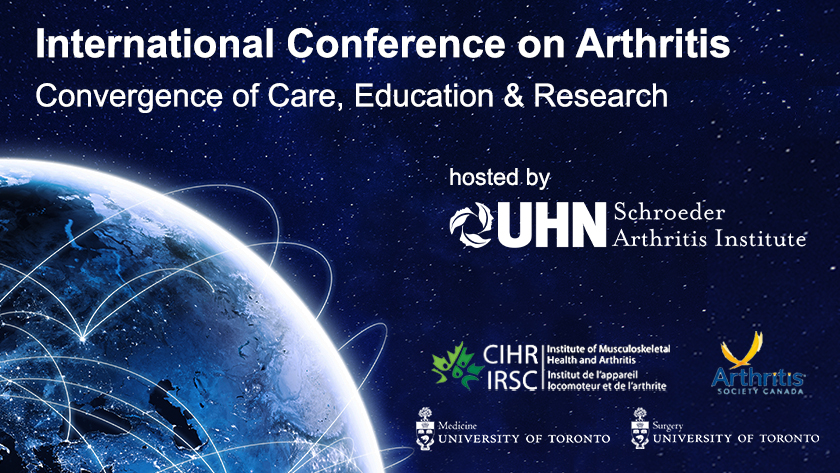
On October 13–14, UHN’s Schroeder Arthritis Institute hosted the inaugural International Conference on Arthritis: Convergence of Care, Education & Research.
The free virtual event was broadcasted live worldwide and showcased cutting-edge research and innovations in clinical care for bone, joint, spine and autoimmune rheumatic diseases. The event brought together over 800 participants from around the world, including scientists, clinicians, patient partners and members of the public.
Attendees heard from 34 speakers including researchers, clinicians and educators with expertise in arthritis and related diseases. They also heard from patient partners who gave inspirational talks about their experiences living with arthritis.
The conference covered a wide range of topics and featured four keynote talks:
● The Burden of Musculoskeletal Disease on Society; Dr. Jasvinder Singh, University of Alabama
● Patient Phenotyping in Osteoarthritis: Data Driven Precision Medicine; Dr. David Hunter, The University of Sydney
● Molecular Phenotyping in Lupus; Dr. Virginia Pascual, Weill Cornell Medical College
● Multi-omic system based approach in Arthritis; Dr. Timothy Radstake, AbbVie
Missed the conference? Click here to access session recordings and information about the speakers.
“Arthritis is a global challenge that calls for a global response,” says Dr. Robert Inman, Co-Chair of the conference and Co-Director of the Schroeder Arthritis Institute.
“The event brought together speakers and attendees from across Canada and abroad, including the USA, Europe, Australia and Asia, and has set the bar for future conferences of its kind,” adds Dr. Mohit Kapoor, Co-Chair of the conference and Co-Director of the Schroeder Arthritis Institute.
The International Conference on Arthritis was hosted by the Schroeder Arthritis Institute, in partnership with Arthritis Society Canada, the Canadian Institutes of Health Research-Institute of Musculoskeletal Health and Arthritis, and the Departments of Surgery and Medicine at the University of Toronto, and was supported by the UHN Foundation.




